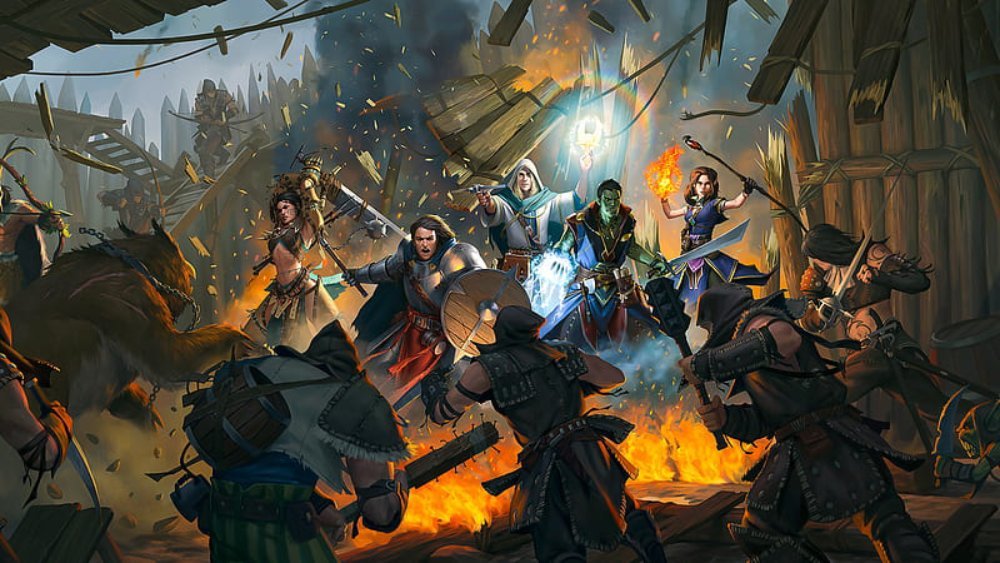The tabletop role-playing game (TTRPG) landscape has long been dominated by Dungeons & Dragons (D&D), a cultural icon since its inception in the 1970s. However, in recent years, Pathfinder, a game published by Paizo Publishing, has emerged as a significant competitor, carving out a substantial niche in the TTRPG community. The rise of Pathfinder, often referred to as the "other" major fantasy role-playing game, is a fascinating story of strategic innovation, community engagement, and the power of open gaming.
Pathfinder's origins can be traced back to the early 2000s when Wizards of the Coast, the company behind D&D, released the 3.5 edition of the game. This edition, with its intricate rules and expansive options, garnered a dedicated following. However, in 2008, Wizards of the Coast announced the release of the 4th edition of D&D, a significant departure from its predecessor in terms of mechanics and style. This left many fans of the 3.5 edition feeling alienated.

Paizo Publishing, recognizing an opportunity, stepped in with the Pathfinder Roleplaying Game, released in 2009. Pathfinder was built on the Open Game License (OGL) system, a legal framework that allowed third parties to use and modify the rules from the 3.5 edition of D&D. Pathfinder essentially became an enhanced continuation of the 3.5 edition, offering a familiar yet refined experience for players who were dissatisfied with the 4th edition of D&D.
Pathfinder's initial success can be attributed to several key factors. First, Paizo's deep understanding of the 3.5 edition's fanbase allowed them to make thoughtful improvements and additions that resonated with players. They introduced more flexible character creation options, expanded class choices, and refined rules that maintained the complexity and depth beloved by many. This attention to detail and player feedback fostered a loyal community.

Additionally, Paizo's commitment to high-quality content and production values helped set Pathfinder apart. The company produced a series of Adventure Paths, which are comprehensive, multi-part campaigns that provide rich storytelling and world-building. These campaigns became a hallmark of Pathfinder, offering players and game masters (GMs) a wealth of resources to enhance their gaming experiences.
Community engagement has also been a cornerstone of Pathfinder's success. Paizo has consistently involved its community in the game's development through open playtests and forums where players can share feedback and suggestions. This collaborative approach not only improved the game but also built a strong, invested player base.
Pathfinder's rise was further solidified by the release of the Pathfinder Second Edition (PF2) in 2019. PF2 introduced streamlined mechanics, new character options, and an emphasis on narrative flexibility, making the game more accessible to new players while retaining the depth appreciated by veterans. The second edition demonstrated Paizo's ability to evolve and innovate while staying true to its roots.

While D&D has seen a resurgence in popularity with its 5th edition, Pathfinder remains a formidable competitor. The two games coexist, each offering distinct experiences that cater to different player preferences. D&D's 5th edition is praised for its simplicity and narrative focus, appealing to new players and those seeking a more straightforward approach. In contrast, Pathfinder is celebrated for its intricate mechanics and expansive customization options, attracting those who enjoy detailed character building and complex gameplay.
The rise of Pathfinder in competition to Dungeons & Dragons underscores the vibrancy and diversity of the TTRPG community. It highlights how different approaches to game design and community engagement can coexist and thrive, providing players with a rich array of choices. Pathfinder's success is a testament to Paizo's responsiveness to player needs and its dedication to creating a game that offers both depth and flexibility. As the TTRPG landscape continues to evolve, the healthy competition between Pathfinder and Dungeons & Dragons ensures that players will benefit from ongoing innovation and creativity in the genre.

